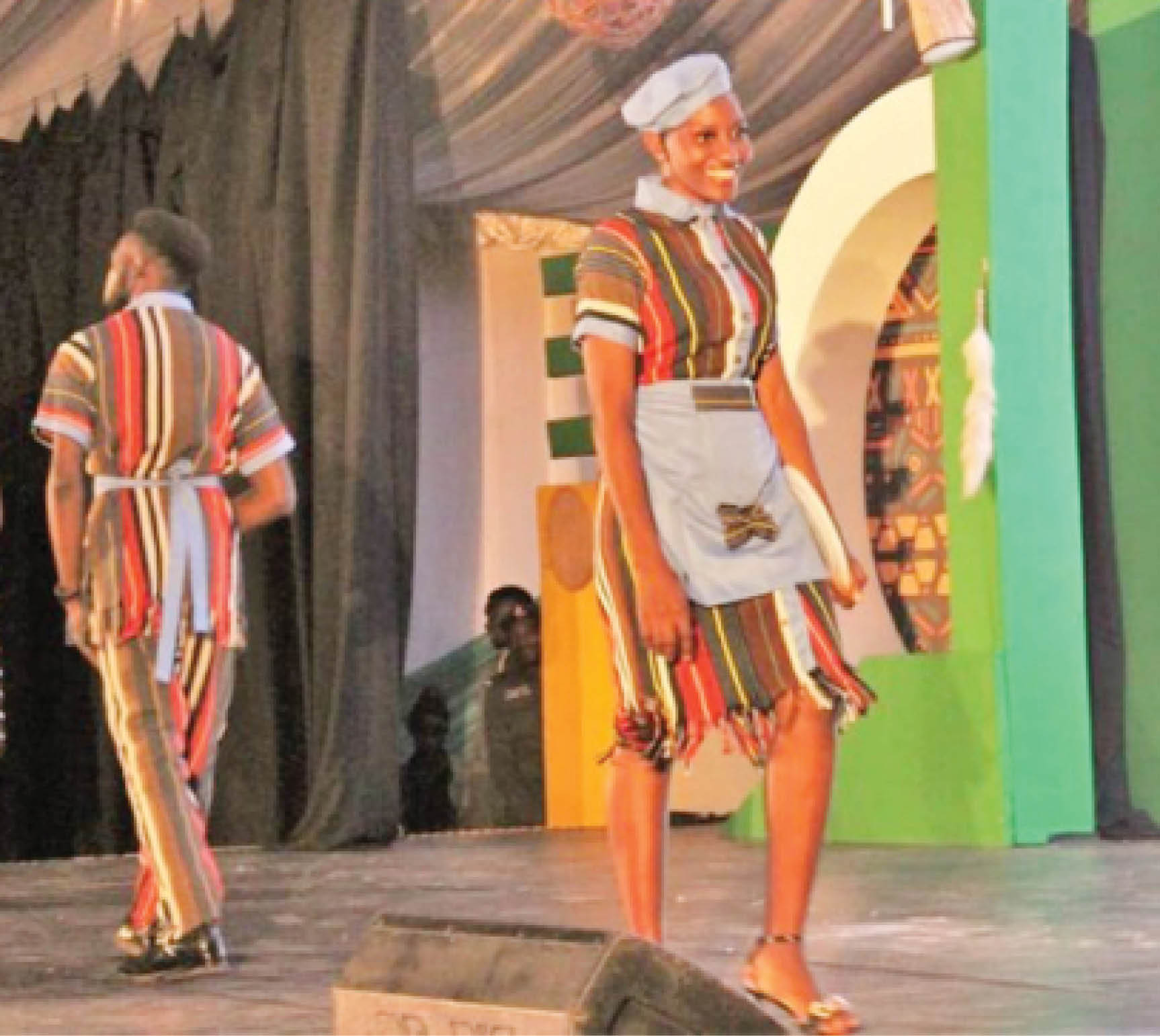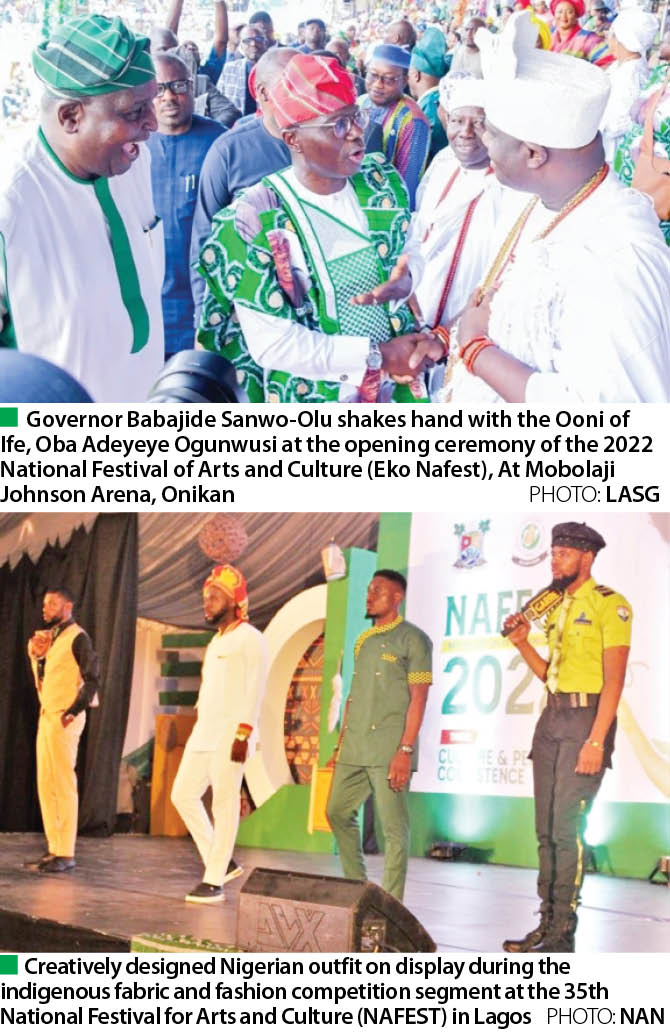NAFEST 2022: Using culture to preach peaceful co-existence
The 35th edition of the National Festival of Arts and Culture (NAFEST) tagged “Eko NAFEST 2022” with the theme, “Culture and Peaceful Coexistence”, which comes to a close today in Lagos has been an avenue to showcase the diverse culture of Nigeria and her strength in diversity. The cultural displays at the opening ceremony of […]

The 35th edition of the National Festival of Arts and Culture (NAFEST) tagged “Eko NAFEST 2022” with the theme, “Culture and Peaceful Coexistence”, which comes to a close today in Lagos has been an avenue to showcase the diverse culture of Nigeria and her strength in diversity.
The cultural displays at the opening ceremony of the National Festival of Arts and Culture (NAFEST) projected the unique elements of dances peculiar to states like Ogun, Rivers, Imo, Nasarawa, Kano, Bayelsa, Ekiti, Benue, Abia, Kaduna, Niger, Oyo, Jigawa, Edo, Delta, Ebonyi and more.
Children’s book harps on cultural identity
International Hausa Books and Art Festival returns to Kaduna
Delegates participate in various competitions including Ayo, Archery, Traditional Cuisine, Essay writing and others.
Some of the states also displayed unique aspects of their culture in the course of the performance, bringing to light their major preoccupation, arts and crafts.
Revellers were excited as colourful masquerades also performed, revealing the real and intriguing African culture. Also, the display of Nigerian creativity in indigenous fabric designs left many marvelled. This is due to the level of creativity displayed by various states who had used local fabrics peculiar to their state to make different costumes.
The indigenous fabric and fashion competition segment of the festival held at the National Stadium Lagos had states like Bayelsa, Delta, Ogun, Kogi, Ekiti and Kwara exhibit their wealth of creativity.
Delta State took creativity to another level as they exhibited local fabrics used to create security personnel’s uniforms, chefs’ uniforms and some corporate attires. The local fabrics used include aso-oke, ankara, adire, and isiagu.
Also, Ogun State was not left behind as they showcased the essence of beauty in simplicity, the fact that fashion was not just an outfit but a statement was reinforced.
The state known for its mass production of adire fabrics displayed different uniforms made with the fabric in colourful and beautiful designs.
Lagos State, rich in rafia and many other resources, displayed footwears made with the combination of rafia and aso-oke.
Similarly, Rivers State affirmed its rich cultural heritage with the unique exhibition of carefully designed uniforms for various purposes.
Kwara State manipulated local fabrics peculiar to the state to produce different styles. The state, known with local fabrics like asho-etu and sanyan used in ancient times for wedding ceremonies, created lovely outfits to the amazement of the revellers.
Etu combined with adire fabric was also used to make their shoes.
Ekiti State, in a dramatic display, presented the local Ala.
Kogi exhibited locally hand-woven material called Ashi, used by the wealthy class in the society in the olden days.
The state strategically designed Ashi in multiple colours, carefully collected from states across the federation, to sensitise Nigerians on the need to remain one as a nation.
Bayelsa had beautiful Etipiri, abada, aso-oke as well as tie and dye fabrics on display.
The indigenous fabric and fashion exhibition will be an eye opener for Nigerians and it behoves on Nigerian leaders to latch on the enormous opportunities in the textile industry.
This is another industry capable of addressing the nation’s challenge on employment.
Lagos State governor, Babajide Sanwo-Olu, while declaring the event open, called on Nigerians to see the country’s rich, multi-cultural heritage and language as unifying factors.
He said that rather than seeing the differences in language and culture as a dividing factor, Nigerians should see it as one of the greatest resources to be embraced, celebrated and used for collective advantage.
“As we all know, this is the campaign season as our nation’s general elections have been scheduled to hold within the first quarter of 2023.
“As political office holders continue to engage the electorate at this period, it is important to re-echo the message of unity and peaceful co-existence which the NAFEST platform provides.
“As we celebrate the Nigerian heritage and cultural diversity here today, my clarion call is that we take this as an opportunity to elect leaders who will recognise and take advantage of our rich, multi-cultural heritage and language to unify us as a people and as a nation,” Sanwo-Olu said.
According to him, it is the intention of the founding fathers of the country that Nigerians shall remain united.
He described the 35th Edition of the NAFEST as a festival aimed at uniting and showcasing the rich and diverse culture of Nigeria.
Chief Olusegun Runsewe, Director-General, National Council for Arts and Cultural (NCAC), organisers of NAFEST, said the seven-day cultural festival was deliberately planned as a unifying ground for exchange of culture, promotion of the country’s rich cultural heritage, skills acquisition and talk shows that are aimed at improving the peaceful co-existence of Nigerians.
He noted that if Nigeria must be great again, the nation’s culture must be continually upheld.
He said Nigeria used to be the most united nation before now, adding that the nation’s lost glory could be revived through exploration of culture.
Runsewe, who made references to how Lagos State had contributed to global growth in the areas of sports, tourism and entertainment, said culture was also a veritable tool to eradicating poverty in the country.
He commended Sanwo-Olu on his efforts at ensuring the 35th NAFEST holds in a grand style, describing the governor as a man with great passion for tourism, arts and culture.
“Today, we have 29 states here in Lagos to celebrate our diversities and cultural heritage, for me, this is the best country across the globe,” he said.
Mrs Uzamat Akinbile-Yusuf, Lagos State Commissioner for Tourism, Arts and Culture, urged Nigerians to visit the state known as the City of Excellence and Aquatic Splendour.
“I want to implore everyone here, especially our contingents from other states across the country to use the opportunity of this festival to explore the abundant tourism potentials in different parts of Lagos State.
“Here in Lagos, our nightlife activities remain top-notch, being a 21st century economy.
“You have heard of the popular phrase “Eko for Show” which echoes creativity, pomp and pageantry peculiar to Lagosians,” she said.
Highlights of the festivals include the display of different cultural dance, children drama as well as the indigenous fabric and fashion competition where delegates exhibited their wealth of creativity by using local fabrics peculiar to their state to make different costumes.
Revellers also took advantage of the cultural market to purchase different crafts and arts
The festival also triggered chains of business activities as different kinds of vendors try to secure vantage positions to display their wares for business.
Indeed, NAFEST 2022 has served its purpose of providing a platform for mobilizing stakeholders in the arts and culture industry to interact, showcase talents and project the values of our heritage as well as develop the spirit of national identity and peaceful co-existence.
The cultural fiesta, which attracted contingents from all over Nigeria, did not only serve as a platform for the exhibition of Nigeria’s arts and culture but also provided a unifying link for the diverse ethnic groups in the country as evidenced in the transactions, friendliness and atmosphere of warmth which was on display during the one-week event.
The festival was attended by many traditional rulers from within and outside the state, including the Ooni of Ife, Oba Adeyeye Ogunwusi.
